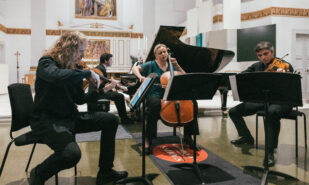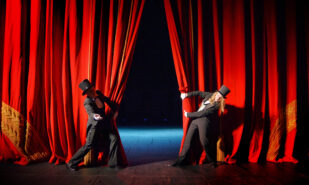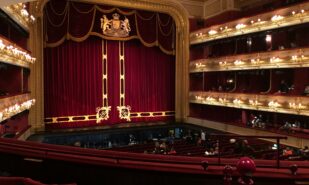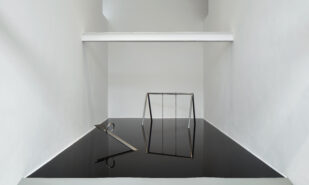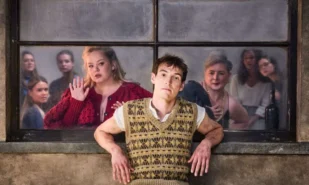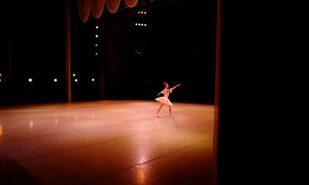A Classic Tragedy: Dominic West as Eddie Carbone
Let’s say it straight away: this is very much an actor’s play. Director Lindsay Posner focuses on dissecting characters, clearly scrutinising every move. The character of the main protagonist is particularly well-examined.
From the very first appearance of Eddie Carbone on stage, it is clear that he is consumed by a completely hopeless hysterical passion, initially a customary secret, but unravelling like a spring or the cylinder of a revolver in Russian roulette (but all the chambers are loaded). Hysteria as a diagnosis, not a dismissive term, from nowhere to nowhere—literally into a deadly nothing.
If we talk about the school of performance, it is an incredible old-school classic—warm and cozy. It seems that such acting is no longer common, but here it is, still alive, and the audience is completely enraptured, empathetically shouting and sighing. For the entire two hours, the actors exist in the highest degree of tension, without a second to relax. It seems as though the air hums with tension like a transformer. Nearly all the actors perform with broad, juicy strokes, as if they are painting with undiluted oil.
A watercolour intonation is gifted only to one character—the narrator, lawyer Alfieri (Martin Marquez), who guides us through these nine circles of hell. Alfieri is almost always on stage, either narrating or sitting to the side, observing his own memories. He flows from the present to memories like a bodiless spirit, appearing now in the present, now in the past, like a melancholic Cheshire cat covered in silver fur. He appears downstage, looking out into the audience, very quietly, thoughtfully, almost sternly narrating the tragedy of the Carbone family.
The plot of Miller’s play is dedicated to illegal Italian immigrants in America—a period in history about which many works have been written, with Miller’s being one of the most vivid. Young niece Catherine (played by the incredibly beautiful Nia Towle) lives with her aunt and her husband, who are from the old wave of Italian immigration, and as the girl blossoms, her uncle increasingly shows his feelings for her. No, Miller did not write a second “Lolita”; this is a completely different story, though both were written in ’55. He created not a domestic drama but a sharp social one—a drama where betrayal is contrasted with love, and the thirst for possession with freedom, but also the state machinery with the search for a common language between an honour student of American descent and an Italian illegal immigrant.
That is, the uncle’s depraved passion for his niece by marriage is not the main focus in “A View from the Bridge,” although it is the driving force of the plot.
This Eddie seems not so much a seducer as one who is seduced. Oh, this blooming youth, slender wrists, a mop of hair, a radiant smile. She seems not at all averse to embracing, grabbing a hand, pressing close. Yet all this is dictated by childhood habit, not emerging femininity. But from the very first scene, we see that Eddie behaves… improperly.
We are immediately thrown into an already established passion, which will not develop further. There will only be a gradual dehumanisation, a transformation of one vice into another.
In this performance, Dominic West is both king and god; it’s a true tour de force. Everyone plays about him and for him, even in moments when he is not on stage. The lanterns shine for him, and the decorations seem also made for him. He dominates the space like a combine harvester over a wheat field, unashamedly and routinely. In short, dockworker Eddie Carbone looks more like a king than a labourer, as if he accidentally stumbled into the impoverished surroundings of a neighbourhood near the Brooklyn Bridge.
Three-story modest houses with black walls surround a small patch of stage, menacingly looming over the similarly anthracite-coloured wooden furniture: a table, chairs, a rough rocking chair – the throne of this curly-haired deity.
West dances his role with the soles of his rough work boots, every broad gesture, every raised eyebrow. It’s so vivid that it can be seen from the last row of the balcony. Very expressive.
It is hard to find anything that can justify this Eddie. He is torn apart by jealousy, desire, hatred – and it must be said, his hatred is very diverse. Hatred towards the youth of a young Italian, his own looming old age, his own impotence.
And, of course, the object of his passion suffers the most. To keep this girl by any means, to bind her to himself, to prevent her from having her own life—this thought, so boundless and so painful, compels him to commit a multitude of terrible acts.
Around Eddie is a whole carousel of diverse characters. His niece Catherine (oh, those eyes! Oh, that smile! Oh, those slender ankles, clasped by the straps of old-fashioned shoes—all in the fashion of the fifties!). She is not yet a flower, but a bud—strong and fresh.
Next to her is her aunt Beatrice (Kate Fleetwood) – a tired appearance, a drab striped apron, slicked-back hair, a coat wrinkled at the hem. Why? Why does she neglect herself to such an extent – this Italian woman in New York? “You haven’t worked a day!” her husband throws at her irritably. And he obviously lies – because it was she who raised this girl while he disappeared at the port and drank beer with the guys, she ran the household on the money he gave her for expenses, doing the best she could. Okay, the coat is old, but could she have ironed it? No, she couldn’t: she doesn’t care, he doesn’t love her. And she has long since given up on herself, just meekly hunching her shoulders, stretching her neck, and enduring, enduring, enduring, her lips pressed into a thin line.
Into this triumvirate crash two Italian relatives. The moustached, spirited, and amiable Marco (Pierro Niel-Mee) and the blond, handsome Rodolpho (Callum Scott Howells), who becomes the catalyst of the story. Young, lively, with an elastic expressive face (the audience laughs quite a bit at his antics) – how could our young Catherine not fall for him?
Of course, they are so young and attractive, just like a pair of porcelain figurines, the Shepherd and the Shepherdess. And here is the opulent uncle, increasingly contorted by jealousy (this is not just a figure of speech; Eddie-West’s fingers sometimes become like claws).
Thus, they circle around this small stage area enclosed by black walls, like in a ring—where, incidentally, textbook-perfect staged fights occur. The impacts are so loud that the audience audibly gasps.
Everything finally collapses into the maw of hell at Christmas and immediately after. Here, Beatrice and Eddie are taking down and packing up Christmas decorations. They seem to be wrapping them in paper, but their conversation is so tense that they place the toys on the table and into the box very carelessly. The plastic toys click, giving the scene an entirely different symbolism: a family activity that should be full of warmth and coziness turns into a tragedy – a deceit. Deceit, dishonesty. Betrayal at every step.
Yes, betrayal in the very real biblical sense. This play is a biblically resolved story of betrayal and retribution, of a line that, once crossed, cannot be uncrossed.
If there’s a gun hanging on the wall… oh, sorry, a phone – then this phone must come to life. Throughout the first act and even the beginning of the second, it hangs on the wall as a dead black box, but suddenly it lights up with a deathly blue glow.
Eddie rattles coins, then pulls out a shimmering coin from his pocket – exactly like one of the thirty pieces of silver. From this moment, his feet sweep across the stage as if he’s walking through a desert, burning on the hot sand.
Meticulously following the text of the play, the performance reaches its tragic finale, accelerating in rhythm. One might think that truth has triumphed, that retribution has struck Eddie with a gleaming blade. But no—he simply dies. And once again, it is his women who are left to bear the suffering.


